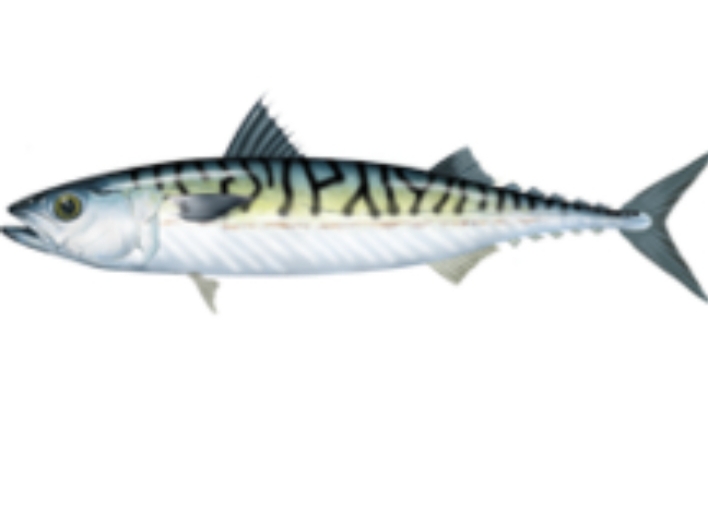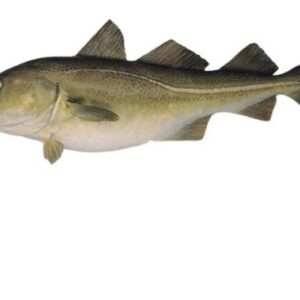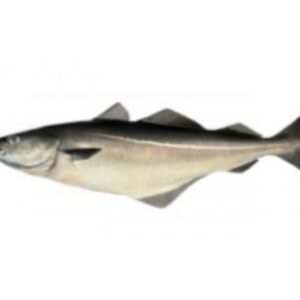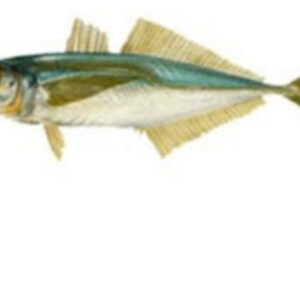The Atlantic mackerel (Scomber scombrus) is a fast-swimming, migratory fish found in the North Atlantic Ocean. Known for its rich flavor and oily flesh, it’s a popular choice for cooking and is highly regarded for its nutritional benefits, particularly its high content of omega-3 fatty acids.
Key Characteristics:
- Appearance:
- The Atlantic mackerel has a streamlined, elongated body with iridescent blue-green stripes on its back and silvery sides and belly.
- It typically grows up to 30-50 cm (12-20 inches) and weighs between 0.5 to 1 kg (1-2 pounds).
- It has two distinct dorsal fins and a forked tail, which helps with its fast swimming abilities.
- Habitat:
- Atlantic mackerel are found in both the western and eastern parts of the North Atlantic, ranging from North America’s eastern seaboard (from Labrador to North Carolina) to Europe’s coastlines (from Norway to Portugal).
- They prefer coastal and offshore waters and often inhabit depths of 10 to 200 meters, depending on the season and water temperature.
- Mackerel tend to migrate seasonally in large schools, following plankton and other prey sources.
- Behavior:
- Highly migratory and moves in large, dense schools.
- They are carnivorous and feed on small fish, plankton, squid, and crustaceans.
- Known for their agility and speed, Atlantic mackerel can swim at speeds of up to 5.5 meters per second.
Nutritional Profile:
Atlantic mackerel is considered a nutrient-dense fish, offering a range of essential vitamins, minerals, and healthy fats:
- Omega-3 Fatty Acids: One of the richest sources of heart-healthy omega-3s, which help reduce inflammation and support brain and heart function.
- Protein: High-quality protein that helps in muscle repair, growth, and overall body maintenance.
- Vitamin D: A key nutrient for bone health and immune system support.
- Vitamin B12: Essential for nerve function, red blood cell production, and energy metabolism.
- Selenium: An antioxidant mineral that protects cells from damage and supports thyroid function.
Health Benefits:
- Heart Health: Omega-3 fatty acids in Atlantic mackerel help lower cholesterol levels, reduce blood pressure, and decrease the risk of heart disease.
- Brain Function: The omega-3s, especially DHA and EPA, found in mackerel are vital for cognitive function and may help prevent age-related cognitive decline and improve mood and mental health.
- Bone Health: Mackerel is an excellent source of Vitamin D, which aids calcium absorption, promoting stronger bones and reducing the risk of osteoporosis.
- Anti-inflammatory: Omega-3s have anti-inflammatory properties, which can help manage conditions like arthritis and other inflammatory disorders.
- Weight Management: Mackerel is high in protein and healthy fats, which help with satiety and weight management by keeping you full for longer.
Culinary Uses:
- Grilling: Due to its oily nature, Atlantic mackerel is perfect for grilling. Its rich flavor pairs well with lemon, herbs, and spices.
- Smoking: Mackerel is commonly smoked, which enhances its flavor and makes it a popular ingredient in salads, sandwiches, or as a standalone dish.
- Baking: Mackerel can also be baked with various seasonings. It’s often baked whole, stuffed with vegetables or herbs.
- Canning: Atlantic mackerel is frequently canned in oil or brine, making it a convenient and nutritious snack or salad ingredient.
- Sushi and Sashimi: In Japanese cuisine, mackerel is often used for sushi and sashimi due to its robust flavor and texture.
Sustainability and Fishing:
- Commercial Fishing: Atlantic mackerel is an important species in commercial fishing, particularly in Europe and North America. It is typically caught using purse seines, trawls, and hook-and-line methods.
- Sustainability: Atlantic mackerel is considered a relatively sustainable choice when harvested responsibly. Many fisheries adhere to strict quotas and management practices to ensure the population remains healthy.
- Conservation Status: While Atlantic mackerel populations are generally stable, some regional concerns exist about overfishing. Sustainable fisheries management is crucial to maintaining healthy stocks.
Fun Facts:
- Atlantic mackerel are known for their incredible speed and endurance. They can swim in schools of thousands and are often seen jumping out of the water while chasing prey.
- Unlike many other fish, Atlantic mackerel do not have a swim bladder, which allows them to sink more quickly when they stop swimming, making them highly agile predators.
Keywords:
- Atlantic Mackerel
- Omega-3 Fish
- Heart-Healthy Seafood
- Sustainable Fishing
- Rich Flavor
- Grilled Mackerel
- Smoked Mackerel
- Vitamin D Source
- Brain Health
- High-Protein Fish




Reviews
There are no reviews yet.